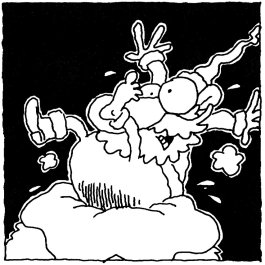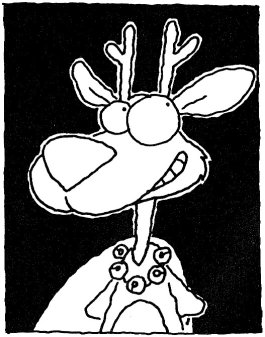Read by Michael Flamel

It felt like a haunting. The chickens, for no discernible reason, had stopped laying eggs. Our rain gutters were suddenly plugged; likewise, and seemingly overnight, the chimney flue began to belch clouds of smoke into our living quarters. The family cat refused to enter the house; Mr. Bobbitt cowered on the porch, unwilling to be coaxed indoors even by the rarest morsels of canned mouse-helper.
Country life tends to attain a routine and comfortable consistency, so that any single anomaly stands out in sharp relief against the bucolic blandness of everyday. Something, some weird event, had subtly changed the feng shui of our house, imparting an odd constriction of its karma. Although assured by many, not excluding my wife, that I am hardly the most observant person ever born, one could not avoid noticing these things.
All the above malfunctions were almost eclipsed by the mysterious but meaningless clues lying in plain sight all around our sleeping garden. How, for instance, did a patch of black snow appear on top of our dormant compost heap, with a deep depression centered like a navel? Why had the garden toolshed collapsed? And most intriguing of all, who had made one line of strange footprints in the snow, leading from our garden gate to the clothesline? Imprints of a man’s left boot, spaced almost ten feet apart. The police declined to investigate, other than a cursory viewing of our garden. Weird stuff, but no visible crime, they said.
It seemed best to consult the Willamette Valley’s most esteemed garden detective: Sherlock Jones.

He arrived in the forenoon, and I cringed to think what this rapid response might translate into when applied on his bill. Nonpareil among garden detectives, Mr. Jones does not shrink from adding surcharges on emergency calls, for his time is gold.
“The police have already been here,” he said abruptly to me, alighting from a classic midnight-blue 1968 Mercedes SEL 6.3. This was either a stunning guess or pure psychic reception, and I told him so. “No, I could smell their cigarettes,” said Jones. As you might watch your mechanic to see how your car is fixed, I have made a study of Sherlock Jones and his methods, and, having learned a few things, I deduced that he had just quit smoking, because 1) he bristled like a dog in a house full of ghosts; 2) he did not immediately produce his pipe and light it; 3) his clothing no longer reeked of the foul stench one associates with smokers; and 4) he was wearing a button that said, “I AM KICKING BUTTS TODAY.”

“The inspectors found nothing,” said Jones, clawing at his chest (I inferred the existence of a transdermal nicotine patch), “which I can state as fact because you summoned me. To anticipate your other questions, in order, yesterday I ceased to use tobacco in any form. Second, Miss Watson does not accompany me because while I am in the throes of nicotine withdrawal, I become what she calls “The Werewolf of Baker Street’ and ‘a real’—but never mind. Take me to the scene of the mystery.”
If the cat had been trembling before, the sight of Sherlock Jones in full winter uniform—houndstooth cape, Canadian Mountie arctic hat with earflaps trimmed in fur, high-polished garden boots from Walt Nicke, and a hoe-handle for walking staff—sent him off like a shot into the barn. “Poor kitty,” said Jones affectionately, as if to the absent cat. “Something, clearly, has frightened you.”
He probed the compost heap with the tip of his cudgel. “And that Something fell out of the sky here.” He scraped the carbonaceous deposit off the crust of the snow. “And it was on fire at the time. Let us repair inside.”
In my study, next to a crackling electric heater on the hearth of the broken fireplace, we dumped seed catalogs and boxes of garden software out of my two Morris chairs, and soon we were sitting with hot cocoa in our hands. Tobacco, we both agreed, would have been a needless addition to our comfort.
“I have solved the mystery, but cannot prove it,” said Jones, chuckling softly. “Worse yet, all the clues will be gone by springtime. But under my theory, I can explain every one of your anomalous events: the plugged rain gutters and flue, the frightened chickens and cat, the mysterious charred ring and depression in your compost, and the footprints of a left boot in the snow. I shall explain it anon. But first, I will fix your chimney.” He left his chair and probed the flue with a poker. A large lump of charcoal fell down, and Jones laughed sadly. “See, my only proof has been burned up! But it suffices to persuade me that my theory is correct. Tell me: What day is this?”
“December 28,” I replied.
“And no doubt these phenomena began about four days ago? Was there anything out of the ordinary on Christmas Eve?”
“Only a scream, and shortly thereafter, an explosion,” I replied. “But I thought it was merely a Jackie Chan video, playing somewhere in the house.”
“No other clues?”
I took a deep draught of my cocoa. “We have just celebrated a holiday with a houseful of relatives, Mr. Jones, who left a wake of churned debris not unlike that of a bison stampede. Any other clues were likely erased in the tumult of their departure.”
Jones sighed. “So many people return to their waking slumber as the New Year approaches, sir, resuming their customary zombie status, as if the season just passed meant nothing more than bills and crowds of arguing relatives. Clues to the secrets of the human heart abound after the holidays, but blind society tosses them out with the tissue paper. We must endeavor always to be kind to one another, do you not agree?” Coming from the normally reserved Jones, this mawkish talk unnerved me; even after one year as an ex-smoker, I fumbled in my pocket for a lung snack, coming up empty. “Of course. But I fear your nicotine-denial program has plunged you into the steep philosophical reverie that accompanies withdrawal, Mr. Jones, I remember it well: a shattering angst borne of great boredom and hunger, that even the largest meal or the most vivid sex could not satisfy.”

“Nicotine is no subtle drug, sir,” said Sherlock Jones. “But even without its aid, I can close my eyes and tell you what happened.” With his mind burning on every cylinder and all his faculties unclouded by smoke, Jones painted the picture for me, using simple words. I could see every event occurring, and the factor that connected them: High on a wintry evening, a Santa Claus so advanced in years that he could not pass a driving examination in any state of the Union, lands on our roof; only after the skids of his sleigh ricochet off our toolshed. Santa goes down the chimney feet-first and makes his delivery, stepping on the cat—hence the scream. On exiting, however, his right boot gets stuck in the narrow damper. He thrashes around, trying to get free. Among the gifts in his sack is a can of black powder for the neighbor over the hill who hunts with a musket and imagines he is Daniel Boone; this Santa accidentally drops. The fire has only recently gone out, and the can lands on the still-hot damper. It explodes, sending Santa like a mortar shell towards the garden. His boot remains behind, plugging the flue.
The cat has moved outside, avoiding all contact with clumsy feet. Mr. Bobbitt has just found a warm feline nest near the pinnacle of some hay bales stacked against the house, with a view of the moonlit night, the bright stars, and the garden below. He is preparing to sleep when a flaming red ball appears overhead, smashing to earth with great force. Naturally, the cat is terrified; Death From Above is a cat’s greatest fear. He resolves to stay on the qui vivre for such meteors falling from the sky without warning; hence, his recent paranoia.

Luckily, Santa’s fall is broken by the compost heap, and the deep snow sizzles out his flaming garments. Ever helpful, Rudolph sheds his harness and flies over to Santa’s aid; by holding Rudolph’s hind leg, the jolly old elf is able to make it back to his sleigh (and his spare dry boots) in a series of long hops. This shocking sight is seen only by the chickens, who think they are witnessing some apocalyptic event, sure to be celebrated—immediately and for ever after—with chicken dinners. They are traumatized.
Yes, this explanation accounted for all events … except: “But what of my plugged gutters?” I wondered aloud.
“Reindeer pellets,” Sherlock Jones advised. ❖
This article was published originally in 1998, in GreenPrints Issue #36.


 Previous
Previous

